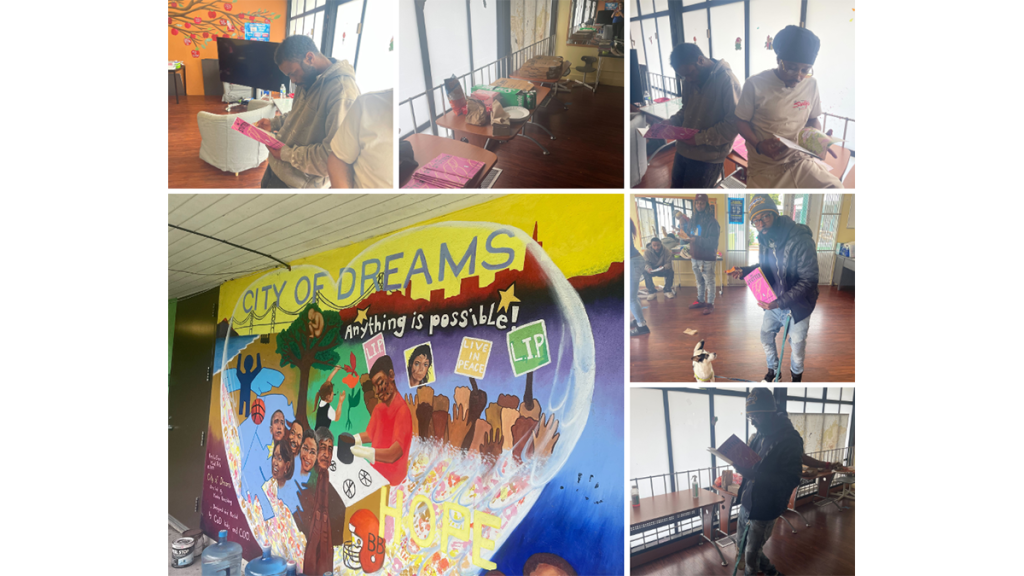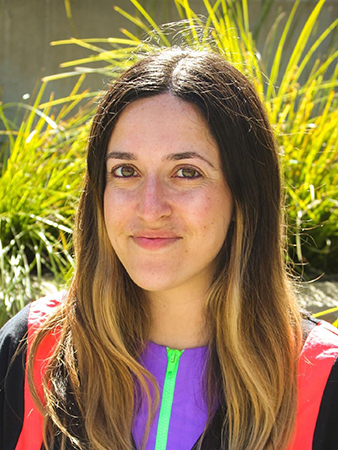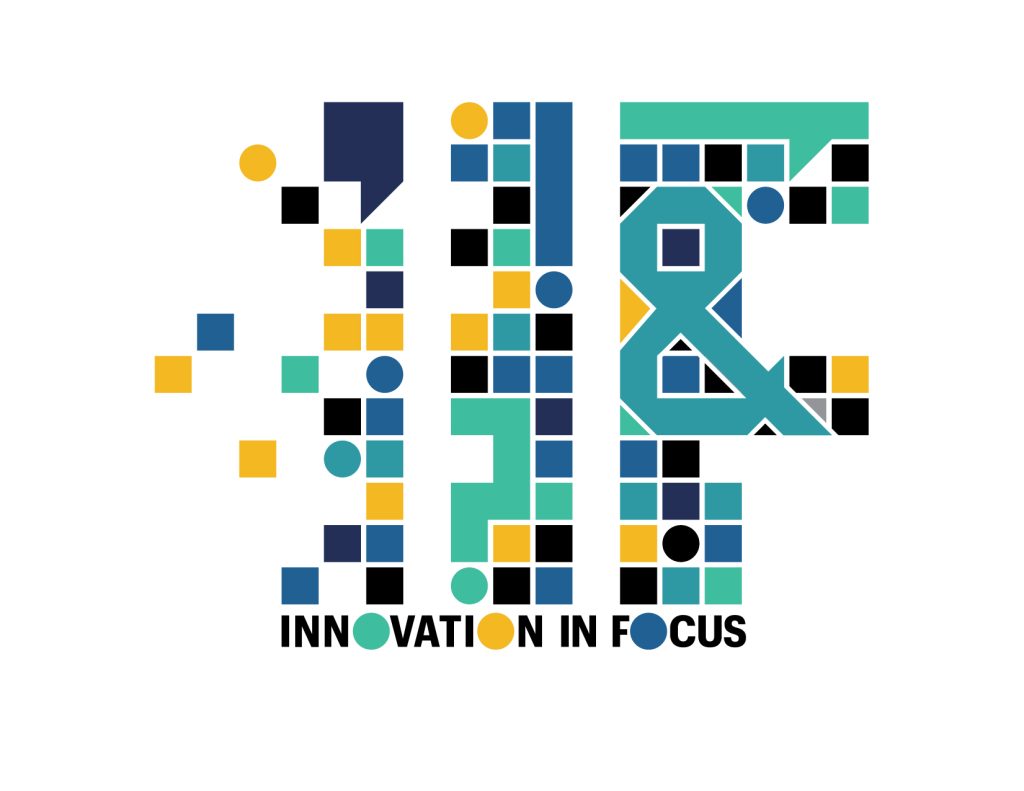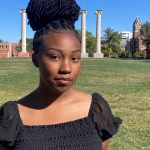
Proud Stutter recently hosted a pop-up pizza party at Hunters Point in San Francisco. Photos: Maya Chupkov
Planning a community pop-up event? Start by talking to local organizers
A conversation with Maya Chupkov, founder of the Proud Stutter podcast
Both through her work at California Common Cause and her nonprofit Proud Stutter, Maya Chupkov has collaborated with community organizations to host multiple pop-up events around the San Francisco area. Whether she’s working to pass local journalism policy or helping to shift the narrative around stuttering, Chupkov has learned lessons in building trust and avoiding extractive relationships.

Chupkov recently hosted a pop-up pizza party to connect new communities with Proud Stutter’s recently published comic book. She shared more about that process and how she approached an event that started with giving rather than asking.
Williams: Can you tell us more about the work you’ve been doing with Common Cause California and Proud Stutter recently?
Chupkov: Common Cause is just about to release a community listening report where we had 12 focus groups and interviewed all these different types of groups from all over San Francisco, including the indigenous population; we had two groups in Spanish, two in Chinese and two with a large segment of the African American population. We partnered with local nonprofits on each of them because they already had that relationship. And because I have been doing organizing work for 10 years, a lot of these relationships I already had. That trust was already there. If I were to do this work in a new city, it would probably take a year to build that trust.
Where Proud Stutter comes in, I had two focus groups in this neighborhood called Hunters Point in San Francisco. This community, if you look at it on a map, is totally separate from the rest of the city, and they don’t get hardly any resources at all. What I learned in the focus group was they were just not used to having anyone show up there and listen. It was a really powerful experience, and it made me realize I really want to get as many resources there as I can. Because their big complaint was that people are always asking something of them, whether it’s a citywide initiative or the mayor’s coming. There’s always a give and take. So I just wanted to do something where I was just giving them pizza and not really asking anything in return.
The cool thing about these comic books that I just got is I’m going to give them a comic book and see what happens. Maybe I’ll have some sort of question like, “What comes up for you when you look at the comic book?” Or, “Do you know anyone who stutters in your community?” Maybe that’s as far as I’ll go. I just wanted to avoid any extraction whatsoever; even though I already built trust with them, I wanted to show them that we can just all hang out. So I think if you’re going to do a pop-up, have one or two of the first ones just be very casual and don’t ask anything.
Williams: What was your goal with this pop-up event?
Chupkov: For me, my goal with this is: There’s so many people who stutter who just don’t have any access to anything. So if I can just give them a comic book and a slice of pizza, who knows? That could go a long way, or that could not. But I think it’s worth it. If your mission is around reaching marginalized communities and lifting up their stories, that’s the only way you’re going to be able to do it if you meet them where they’re at first.
Williams: How did the pop-up go? Did you learn or experience anything that you weren’t expecting?
Chupkov: We had about 15 people total attend. There were a bunch of younger folks who came and seemed really interested in the comic book. One of the young folks even said he stutters himself and knew other people who stuttered. I wasn’t expecting to meet anyone who actually stuttered. It was a Friday afternoon, so it probably wasn’t the best time to do a pizza party, but overall I thought it was a great event, and we were able to reach a lot of people who we would not have been able to reach through the [Proud Stutter] podcast.
Williams: How did you publicize this event? Did you reach out to specific people or use any tools to promote it?
Chupkov: There’s this nonprofit housing developer called San Francisco Housing Development Corporation, and they have resident services staff that are available if residents need anything. These residents services staff are the ones doing outreach, knocking on everyone’s door, doing newsletters; she has all their phone numbers. So, I partnered with her; I made the flyer, and she sent it because she’s already in the community. She already knows that this person is good with email and that person wants me to knock on their door or someone else wants me to call them.
I know not every community has that, but you’d be surprised. I think hiring organizers is really the future of newsrooms because they know their community more than anyone, so if you really want to reach them, you have to partner with someone that’s already part of the community. Even an informal organizer like someone that’s a mom that knows everyone, you can hire her.
Williams: Could you talk more about what went into collaborating with people on these events?
Chupkov: That was probably the hardest part. There were two organizations that I’ve never worked with before. One was the Native American Health Center, and the other one was the San Francisco Housing Development Corporation. I used to have a relationship with them, but they were probably the hardest to get because it’s about knowing who to contact and where.
But it just started with an email. In that email, I talked about what we were working on, the research and that we were trying to organize these focus groups, and we heard from XYZ that this would be a good fit. Then, after some follow up and really making clear that there’s going to be an incentive, that’s when we started getting a response. So you kind of have to keep asking until you find someone that wants to do it because a lot of the time these organizations are just stretched so thin, and if they don’t recognize you, they will not respond. So you kind of have to look for people that can connect you and make sure that they vet you before.
Williams: Could you just talk a little bit about funding for these events?
Chupkov: For the report that we’re doing with the San Francisco focus groups, we got a one-time small grant from California Health Care Foundation. Health-related foundations are super key because I think that they align with “healthy communities equals healthy, fact-based information.”
Then for Proud Stutter, I’m just paying for it from the small budget I have. We have monthly donors, and I have a merch shop and various revenue streams like event ticket sales, a yearly gala, crowdfunding for specific projects, speaker fees for podcasting workshops, a project grant and individual donations.
Williams: Do you have any other advice that we didn’t get to?
Chupkov: One of the things I’ve learned is doing events separate from pop-ups can be good for fundraising. I’ve gotten a lot of donations just from doing these [more fundraising-focused] events. Then, from what I raised there, I can use that money for free events like this pizza party where I’m not asking for any money. For example, we were giving out the comic book at an LA bookstore on Monday, and each comic book was a suggested donation. So, I ended up raising enough to pay for this Friday pop-up event.
Williams: I know a lot of small teams may stay away from community events because it’s a lot to consider – from finding a venue to covering costs and other logistics.
Chupkov: I think the biggest thing around that is just really first focus on the partnership. Find a trusted person from a community organization or somewhere else to tag-team this with you and offer them an incentive because you don’t want them to do this outreach for free. Then, once you build that relationship, the rest will come easy.
Editor’s Note: This interview has been edited for clarity and brevity.

Sign up for the Innovation in Focus Newsletter to get our articles, tips, guides and more in your inbox each month!
Cite this article
Williams, Kendall (2024, March 20). Planning a community pop-up event? Start by talking to local organizers. Reynolds Journalism Institute. Retrieved from: https://rjionline.org/news/planning-a-community-pop-up-event-start-by-talking-to-local-organizers/
